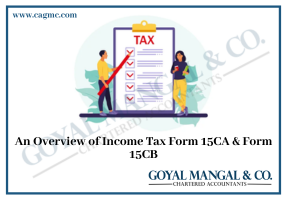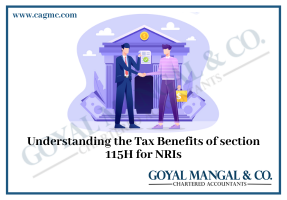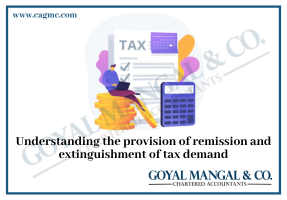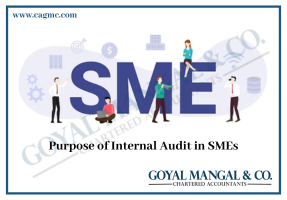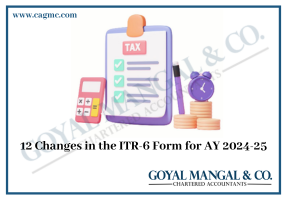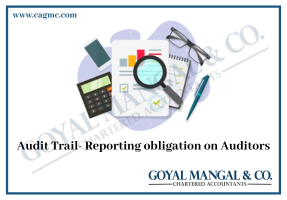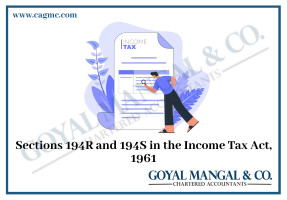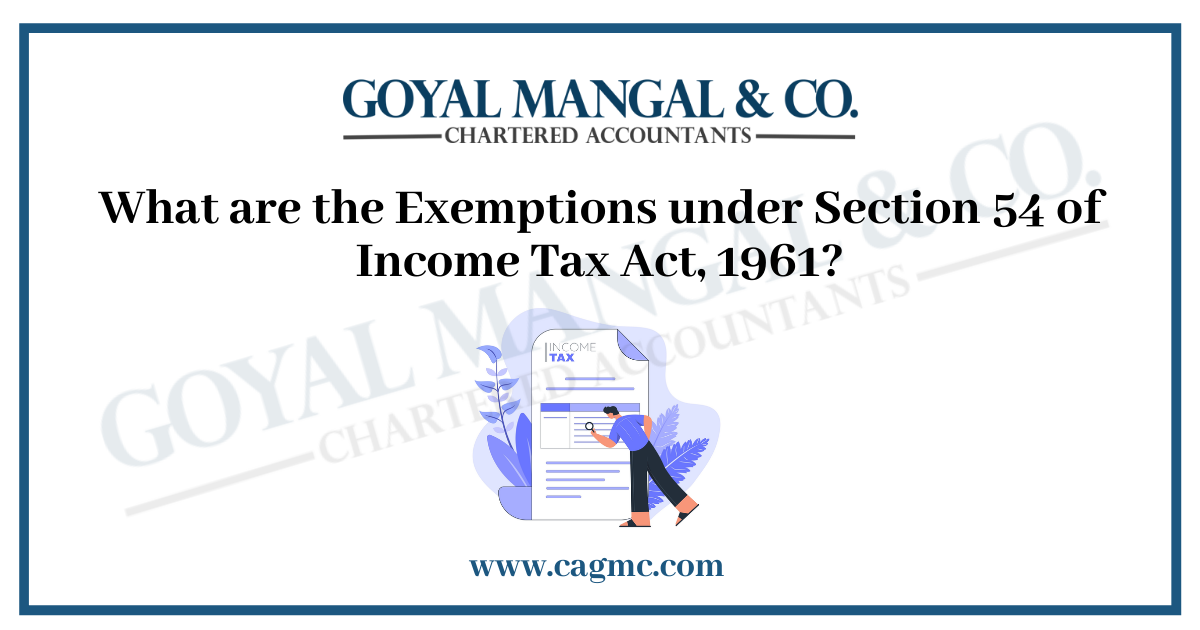
Do you have to change cities to relocate your business? While relocating you may want to sell the old house or the property related to your business. Further, you may also have to sell any other Capital Assets. While filing for your Income Tax, you will have to pay Capital Gains Tax for the profits made in the sale of the Capital Assets. What are the provisions in Income Tax Act that can help you in this? Further, how can you mitigate the amount of tax that you have to pay? In this article, we will discuss the Exemption under Section 54 of the Income Tax Act, 1961.
Capital Asset and its Types
Any kind of property that you own is known as a Capital Asset. However, it may or may not be related to your business. The main categories of capital assets are,
- Movable or Immovable (Land, Building, Property, etc.)
- Tangible or Intangible (Vehicles, Patents, Trademarks, etc.)
- Fixed or Circulating (Machinery, Jewellery, Bonds, etc.)
Under the Income Tax Act, there are two main types of capital assets,
- Short Term: The capital assets that you hold 36 months (3 years) or less are Short Term Capital Assets. The profits you make from the sale of these assets are known as Short Term Capital Gains.
- Long Term :The capital assets that you hold for more than 36 months (3 years) are Long Term Capital Assets. The profits that you make from the sale of these assets are known as Long Term Capital Gains.
However, if you hold unlisted shares, land or other immovable property for more than 24 months (2 years) it is considered a Long Term Capital Asset. Further, it is specified under Section 54 of the Income Tax Act.
Section 54 of the Income Tax Act
As per the Section 54 of the Income Tax Act, any long term capital gains made from the sale of a residential property may be exempt if you,
- Purchase another residential property within 2 years of the sale. Otherwise, if you’ve bought another property previously. Further, you have to sell your previous property within 1 year of the new purchase.
- Construct a new residential property within 3 years of the sale.
Essentially, you have to invest the Capital Gains in another property. You will receive an exemption in your Capital Gains Tax if you do so. However, you can not sell the purchased/constructed from the date of acquisition. If you do so then the exemption that you received will be deducted from your Capital Gains Tax. Further, the gains arising from the sale of this property will be considered as Short Term Capital Gain.
Amount of Exemption under Section 54
Your Capital Gains Tax shall be exempted to the extent it is invested in the purchase/construction of another property (house). The amount that is deducted will be,
- The entire amount of Capital Gains, it the amount is less than or equal to the cost of the new property
- The cost of the new house (as an exemption), if the amount of Capital Gains is greater than the cost.
Essentially, the balance of the Capital Gains amount that you invest in the cost of acquisition and/or construction of the new property will be taxable as per the Income Tax Act.
Illustration
- Suppose you sell your old house for Rs. 25, 00,000. The long-term capital gains arising from which is Rs. 1,000,00. Then you buy a new property for Rs. 10,00,000. Then,
| Sale Value | 25,00,000 |
| Capital Gains Arising | 10,00,000 |
| Exemption | 10,00,000 |
| Taxable Capital Gains | Nil |
*If the cost of acquisition of the new house is more than the Capital Gains made, then also the net taxable Capital Gains remains nil.
- Suppose you sell your old house for Rs. 20,00,000. The long-term capital gains arising from which is Rs. 10,00,000 buy a new house for Rs. 8,00,000. Then,
| Sale Value | 20,00,000 |
| Capital Gains Arising | 10,00,000 |
| Exemption | 8,00,000 |
| Taxable Capital Gains | 2,00,000 |
Eligibility to avail Exemption under Section 54
You will receive the exemption of the amount of Capital Gains if you invest the amount in the purchase/construction of 1 residential property (house). However, the number of houses you own does not matter. You are only allowed the exemption for 1 house only. However, there is an exemption to the rule. If the amount of Capital Gains does not exceed Rs. 2 Crores, you can claim an exemption for the construction/purchase of 2 houses. Further, this exemption can be claimed only once. Moreover, once claimed this exemption cannot be claimed for any other year. The Finance Bill of 2021 amended and brought this benefit to Section 54.
To claim the exemption of Capital Gains you have to satisfy the following conditions,
- Only individuals or Hindu Undivided Family (HUF) can claim this exemption. Companies, LLPs, etc. cannot claim this exemption.
- The property that you are selling should be a Long Term Capital Asset.
- The property has to be a residential house.
- You have to buy/construct the new property within the stipulated time.
- The property has to be in India
- The new property has to be under the same name as the seller
Moreover, you have to fulfill all the mentioned conditions to claim an exemption.
Procedure to Avail the Exemption under Section 54
As mentioned above you have to fulfill the mandatory conditions. Now let us discuss how you can fulfill those conditions,
- You have to purchase a new property or construct a new house after selling your old house.
- You need to purchase the new house within 2 years after the sale of the old house. Otherwise, you can also purchase a house within 1 year before the selling your old house. Further, you can construct a new house within 3 years of selling your old house.
- You can only claim for the purchase/construction of only one house.
- If you fail to buy/construct a new house within the stipulated time then you can deposit the Capital Gains amount to a Capital Gains Account Scheme.
Capital Gains Account Scheme
If you are unable to buy/construct a new property within due date of filing your Income Tax Returns after selling your property you can still save on the Capital Gains Tax. You have the deposit the utilized amount from the proceeds of selling your house a Capital Gains Deposit Scheme. By doing so, you can utilise the amount on a later date. Further, you will also not be taxed. The conditions specified for depositing in the Capital Gains Account Scheme are,
- You have to do it in an authorised/approved bank branch. (Rural branches are not included)
- You need to make the deposit before the due date of filing Income Tax Returns.
- The amount that you deposit has to be utilised to buy/construct a new house as per the provisions of the Law.
- You have to utilize the amount within 2 years or 3 years for the purchase or construction of a new house respectively after the transfer of the old property.
If you don’t utilize the entire amount within the stipulated time then the remaining amount becomes taxable. This means you have to pay Capital Gains Tax on that amount.
Consequence of Transferring the New House within 3 Years
You have to keep the new property that you have claimed an exemption against for 3 years as per Section 54 of the Income Tax Act. If you sell the property within the stipulated time the benefits that you received will be withdrawn. Further, this means you have to pay the tax on the Capital Gains exempted.
Comparison between Section 54 and Section 54F
Both sections 54 and 54F may seem to be very similar. Therefore, the following table is to compare difference between the Section 54 and Section 54F of the Income Tax Act,
| Basis | Section 54 | Section 54F |
| Claiming Full Exemption | The entire amount of Capital Gains has to be invested. | The entire sale receipts has to be invested |
| Amount of Exemption | The amount invested is the amount exempted. | Exemption is proportional.
[Exemption=Cost of the new house x Capital Gains/Sale Receipts] |
| Number of Houses | Does not matter | At the time of claiming, you can only own one. |
| Number of New Houses | If the Capital Gains does not exceed Rs. 2 Crore, you can claim investment in 2 properties as once in a lifetime offer | No such exemption available. |
| Cannot purchase another property | No such stipulation | For 2 years |
| If sold, the Capital Gains from the new property will be taxed as | Short-Term | Long-Term |
The similarities between Section 54 and Section 54F are,
- You have to buy a new residential property to claim exemption
- You need to purchase the new property 1 year before or 2 years after the sale of the old property. Or, you must construct within 3 years of the sale.
- You can deposit the amount of Capital Gains in a Capital Gains Account Scheme before the date of filing Income Tax to save on the payable Capital Gains Tax.
- You have to hold the new property for 3 years
Conclusion
Section 54 of the Income Tax Act gives us the benefit of the exemption on the sale of residential property. You can claim this exemption to help you save on the capital gains tax that is payable. Further, there is also a Capital Gains Account Scheme to help you save on the Capital Gains Tax, in case you are not able to invest the proceeds from selling your old house within the date of filing for your Income Tax. Section 54 of the Income Tax Act is to ensure that you don’t feel the tax is unjustified while selling and buying a new house. Section 54 of the Income Tax Act is there to help you sell your old house.
